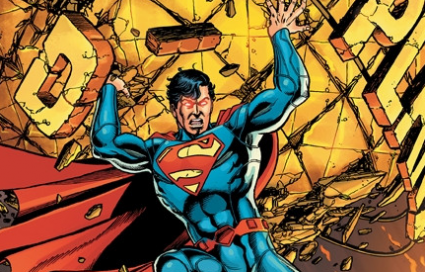As some readers may recall, the rights of the comic book character Superman have long been in contention between Warner Bros. and the heirs of creators Siegel and Shuster. The war appears to be over...
Warner wins key victory in Superman battle
By Ben Fritz
October 17, 2012, 6:26 p.m.
Superman won't be going up, up, and away from Warner Bros.
In a crucial legal victory for the Burbank studio, a federal judge in Los Angeles on Wednesday denied an effort by the heirs of Superman co-creator Joseph Shuster to reclaim their 50% interest in the world's most famous superhero.
Superman is one of Warner's most valuable characters, having generated more than $500 million at the domestic box office with five films and billions of dollars more from television series such as "Smallville," toys and games, and 74 years' worth of comic books.
Had Warner and its DC Comics subsidiary lost the case, they would have soon been unable to continue using certain key elements of the Superman mythos -- including his super strength and speed, secret identity as Clark Kent and girlfriend Lois Lane --without reaching a costly new agreement with the estates of Shuster and co-creator Jerry Siegel.
In 2008, a judge ruled in favor of Siegel's heirs in a similar case, allowing them to terminate half of Warner's Superman copyright as he appeared in 1938's Action Comics No. 1. However, under copyright law, the studio is allowed to use the character however it pleases with its 50% interest so long as it continues paying Siegel's estate half of the relevant profits.
Warner plans to release a new big-budget Superman movie, "Man of Steel," in June. Wednesday's ruling will allow it to produce sequels should that picture prove successful. In addition, the studio has been eager to produce a movie featuring the DC superhero team Justice League as soon as 2015, which would have been impossible without lead character Superman.
U.S. District Judge Otis D. Wright granted summary judgment in favor of Warner, ruling that a 1992 agreement between DC Comics and Shuster's sister Jean and brother Frank was binding and prevented Shuster's estate from attempting to terminate copyrights.
Under that deal, DC paid all of the then-recently deceased Shuster's outstanding debts and agreed to pay Jean $25,000 a year for the rest of her life (it issued additional bonuses to her over the years).
"The court finds that the 1992 agreement, which represented the Shuster heirs' opportunity to renegotiate the prior grants of Joe Shuster's copyrights, superseded and replaced all prior grants of the Superman copyrights," Wright wrote. "The 1992 agreement thus represents the parties' operative agreement and... is not subject to termination."
The Shusters' attorney, Marc Toberoff, who also represents the Siegel estate, expressed surprise after just last week having said September's summary judgment hearing went "very badly" for DC.
"We respectfully disagree with [the order's] factual and legal conclusions," he said in an e-mailed statement. "It is surprising given that the judge appeared to emphatically agree with our position at the summary judgment hearing."
The eight-year legal battle between the Superman creators' heirs and Warner probably won't end soon. The Shuster estate is expected to appeal Wednesday's ruling.
At a Nov. 5 appeals court hearing, the studio will attempt to overturn the Siegels' copyright termination and Toberoff will seek more control over the character for his clients and to deny accusations of impropriety that Warner has made against him.
The case is the latest and highest-stakes dispute between the creators of famous comic book characters and the entertainment giants making more money than ever from them as superheroes have exploded in popularity in the last decade. The heirs of Marvel Comics artist Jack Kirby, also represented by Toberoff, in 2011 lost in an attempt to reclaim rights to such famous characters as the Fantastic Four, X-Men and the Hulk.
In Wright's ruling, he noted that DC has paid the Siegel and Shuster families more than $4 million since 1975, not counting medical benefits and bonuses.
